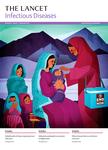版权所有:内蒙古大学图书馆 技术提供:维普资讯• 智图
内蒙古自治区呼和浩特市赛罕区大学西街235号 邮编: 010021

作者机构:Vet Affairs Portland Hlth Care Syst Portland OR 97239 USA Oregon Hlth & Sci Univ Dept Med Div Infect Dis Portland OR USA Vet Affairs Connecticut Hlth Care Syst Vet Affairs Cooperat Studies Program Clin Epidemio West Haven CT USA Yale Sch Publ Hlth Dept Biostat New Haven CT USA Yale Sch Med Biomed Informat & Data Sci New Haven CT USA Yale Sch Med Dept Internal Med New Haven CT USA Vet Affairs Puget Sound Hlth Care Syst Seattle Epidemiol Res & Informat Ctr Seattle WA USA Vet Affairs Puget Sound Hlth Care Syst Res & Dev Seattle WA USA Vet Affairs Portland Hlth Care Syst Ctr Innovat Improve Vet Involvement Care Portland OR USA Oregon State Univ Coll Hlth Hlth Management & Policy Corvallis OR USA Oregon State Univ Ctr Quantitat Life Sci Hlth Data & Informat Program Corvallis OR USA Vet Hlth Adm Publ Hlth Natl Program Off Palo Alto CA USA Vet Hlth Adm Publ Hlth Natl Program Off Washington DC USA Vet Affairs Ctr Medicat Safety Pharm Benefit Management Serv Hines IL USA Vet Hlth Adm Off Res & Dev Washington DC USA Vet Affairs Puget Sound Hlth Care Syst Div Gastroenterol Seattle WA USA Univ Washington Seattle WA USA
出 版 物:《LANCET INFECTIOUS DISEASES》 (Lancet Infect. Dis.)
年 卷 期:2025年第25卷第6期
页 面:625-633页
核心收录:
学科分类:1004[医学-公共卫生与预防医学(可授医学、理学学位)] 1002[医学-临床医学] 100201[医学-内科学(含:心血管病、血液病、呼吸系病、消化系病、内分泌与代谢病、肾病、风湿病、传染病)] 10[医学]
基 金:US Department of Veterans Affairs Cooperative Studies Program US Department of Health and Human Services Biomedical Advanced Research and Development Authority US Food and Drug Administration
摘 要:Background New respiratory syncytial virus (RSV) vaccines have been approved in the USA for the prevention of RSV-associated lower respiratory tract disease in adults aged 60 years and older. Information on the real-world effectiveness of these vaccines is needed. Methods We used electronic health records in the Veterans Health Administration to emulate a target trial comparing a single dose of a recombinant stabilised prefusion F protein RSV vaccine versus no vaccination among veterans aged 60 years and older. We matched eligible vaccine recipients with up to four unvaccinated individuals in four monthly nested sequential trials from Sept 1 to Dec 31, 2023. Outcomes were ascertained up to March 31, 2024. The primary outcome was any positive RSV test from day 14 following the matched index date. Secondary outcomes included hospitalisation and emergency department or urgent care encounter occurring within 1 day before or after a positive RSV test. We estimated vaccine effectiveness as 100 x (1-risk ratio). Findings We included 146 852 vaccinated individuals matched to 582 936 unique control individuals, weighted equally to represent 146 852 individuals. Across the two groups, 276 039 (940%) of 293 704 veterans were male, 17 665 (60%) were female, and median age was 759 years (IQR 717-797). Over a median follow-up of 124 days (IQR 102-150), the incidence rate of documented RSV infection was 17 (95% CI 14-21) events per 1000 person-years (88 total events) in the vaccinated group and 73 (66-81) per 1000 person-years in the unvaccinated group (372 total events), and vaccine effectiveness was estimated as 781% (726-835). Among the secondary outcomes, vaccine effectiveness was estimated at 787% (722-848) against RSV-associated emergency department or urgent care encounters